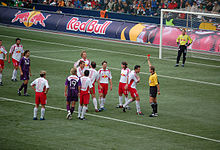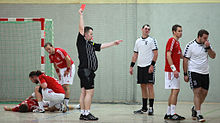Red card
The red card (also red card ) symbolizes a dismissal from the referee against a player in several team sports . It applies to the sports of cricket , soccer , handball , hockey , bike ball and rugby , among others . In the sports volleyball and fencing , the red card is shown to indicate a penalty point has been imposed on an athlete by the 1st referee (volleyball) or the respective referee (fencing).
General
The player concerned has to leave the field of play immediately and without replacement and is no longer allowed to intervene in the current game. In most cases, he will also be banned from one or more of the following games. Deviating from this, the team in handball may be supplemented after two minutes; there is a suspension in subsequent games only if the referee shows a report by showing the blue card , which he later writes. This report causes the game organizing body to initiate disciplinary proceedings.
After a red card, play may only be continued once the referee has given a whistle to clear it. If the ball is played too early, if the rules are interpreted exactly, this will result in a yellow card .
Coaches or assistant coaches can also be referred to the stands from the edge of the field or the technical zone , but in most sports this happens without the red card (in handball the red card is shown, in the case of particularly severe unsportsmanlike behavior the red and blue card ); there was also a phase in football when this was mandatory, but it was withdrawn; a ban for the following games can also be issued against a coach or assistant coach. However, this ban cannot be issued by the referee, but after the referee has reported in the match report by a sports court.
The red card is usually issued for gross unsportsmanlike conduct. This can be gross foul play , assault or insult . In football , the red card is also shown if a foul game or an intentional handball by a field player (" emergency brake ") prevents the opponent from having a clear scoring chance.
In football, when the referee enters the field during the field inspection and after the end of the game, a red card can be shown if there is "gross unsportsmanlike conduct"; after the end of the game the referee must still be on the field of play. In handball, this is also possible outside the playing field.
As a demarcation to the yellow-red card, one speaks of a smooth red card or simply of smooth red .
history
At the 1966 World Cup , the quarter-final match between Argentina and England saw turbulent scenes on the field, which were due, among other things, to the fact that an Argentine player did not understand or wanted to understand, and almost did, the expulsion from the German referee Rudolf Kreitlein remained on the pitch for nine minutes. In the tumult that followed, they even failed to notice warnings against English players. The audience did not notice either.
In order to avoid such misunderstandings, the English referee Ken Aston suggested using yellow and red cards analogous to the internationally known traffic light systems (traffic lights). This rule was used for the first time at the football World Cup in 1970 - but no red card was due there - and it quickly caught on. The first red card at a soccer World Cup was shown on June 14, 1974 in the preliminary round match Germany - Chile against the Chilean Caszely , after a revenge foul on Berti Vogts , by the Turkish referee Doğan Babacan .
In the Federal Republic of Germany, where the use of yellow and red cards was first tested in an indoor tournament in Berlin's regional division in December 1970, midfielder Waldemar Kurpanik from SV Alsenborn received the first red card on January 10, 1971 after a foul on Jürgen Neumann from Wormatia Worms in a German competitive game. The Bochum referee Wilfried Hilker showed the first red card in Bundesliga history on April 3, 1971 in the game between Eintracht Frankfurt and Eintracht Braunschweig , after the Frankfurt player Friedel Lutz committed a foul of revenge against Jaro Deppe . For a long time, the first red card in Bundesliga history was falsely associated with the name Lothar Kobluhn. The man from Oberhausen reported in a newspaper interview that he had seen the red card on October 10, 1970. The Frankfurt referee Dieter Heckeroth only verbally expelled him , as was customary at the time. Even if the card system was introduced at FIFA level for the 1970 World Cup, the rules in the top German league did not move in until the second half of the 70/71 season.
Deliberate handball was initially not punished with a dismissal and thus a red card, not even with a yellow card. Even on the goal line, field players could use their hands to prevent goals without receiving a personal penalty; of course there was a penalty for the opposing team. It was not until 1990 that yellow was introduced for deliberate hand play, and red from 1991.
Since 1991 there has also been the yellow-red card in football , which is shown when a player has already received a yellow card and again commits an infraction for which the referee would show a yellow card . It is also considered a dismissal, but in contrast to the red card, it generally only results in a suspension for one game.
Records
Welsh amateur soccer player Lee Todd holds the record for the fastest known red card. In 2000 he responded to the referee's whistle with the words “Fuck me, that was loud” and was sent off after two seconds for “foul language”. David Pratt of Chippenham Town FC is also frequently mentioned as the fastest red sinner to be sent off for foul play after three seconds in an amateur game. From a technical point of view, there were two faster relegations from the field, but these did not occur at the start of the game, but during a substitution. Walter Boyd of the Welsh club Swansea City saw the red card in the first second, so to speak, because he rammed an opponent's elbow in the face before the referee could whistle again. Keith Gillespie of Sheffield United "succeeded" in the same way in January 2007.
José Batista ( Uruguay ) received the fastest red card in a World Cup match in the game Uruguay against Scotland at the 1986 World Cup, 56 seconds after the start of the game by referee Joël Quiniou (France). Uruguay defended a 0-0 with 10 players over 90 minutes and thus made it into the round of 16.
The fastest red card in the DFB-Pokal so far saw Gelson Fernandes, who played at Eintracht Frankfurt , in the semifinals against FC Schalke 04 just 33 seconds after being substituted on.
Counted from the start of a Bundesliga game, referee Felix Brych showed Youssef Mohamad from Cologne in the game against 1. FC Kaiserslautern on August 21, 2010 due to an emergency brake after 87 seconds.
In March 2011, the referee Damien Rubino pronounced the most red cards in a game in the Argentine fifth division in the game Claypole (suburb of Buenos Aires) against Victoriano Arenas ( Avellaneda ). He dealt a total of 36 red cards to all players, all substitutes and both coaches. There were also excessive dismissals on August 17, 1986 at the top match in the Mexican Primera División between Club América (Mexico City) and Deportivo Guadalajara , in which the referee awarded 22 red cards due to permanent assault.
Effects on the outcome of the game
The purpose of a red card is to reduce the chances of success of the team concerned as a penalty for serious rule violations and thus ultimately to promote fair play . A widespread soccer myth, however, says that a dismissal has no negative consequences for the team, because the other players are motivated to increase their efforts and thereby compensate for the shortage. This thesis has been empirically verified several times. A study based on an evaluation of the Bundesliga between 1999 and 2009 came to the conclusion that red cards have different effects on the game result for home and away teams. According to this, the chances of the home team are generally negatively influenced by a sending off, while this is only the case for away teams if the sending off occurs before the 70th minute of the game. A red card for a player of the away team in the final phase of the game, on the other hand, has a statistically positive influence on their chances of success.
See also
Web links
Scenes from the European Cup game 1.FC Kaiserslautern - Real Madrid in March 1982 Difficult to understand from today's perspective, the deliberate handball of the Kaiserslautern field player Friedhelm Funkel at min. 5:02 to prevent a goal at that time did not lead to any personal punishment.
Individual evidence
- ↑ Information from the Swiss Handball Federation ( Memento of the original from March 9, 2016 in the Internet Archive ) Info: The archive link has been inserted automatically and has not yet been checked. Please check the original and archive link according to the instructions and then remove this notice. : "The new handball rules from July 1, 2016", published on March 8, 2016, accessed on March 9, 2016.
- ^ Hardy Greens : Football World Cup Encyclopedia , Agon-Verlag, ISBN 9783897843806 .
- ↑ "Indispensable knowledge: Waldemar Kurpanik" in: Zeitspiel No. 10, 4th quarter 2017, p. 12.
- ↑ Kicker Sportmagazin , born in 1971, issue 28.
- ↑ Note in: A man sees red , in WAZ, December 21, 2013, sports section.
- ↑ 1970/71: Lothar Kobluhn on the first expulsion: "Inarticulate sounds of the player Kobluhn" , accessed on December 15, 2015.
- ↑ Kicker Sportmagazin , year 1970, issue 83.
- ↑ : An overview of rule changes in football I
- ↑ : An overview of rule changes in football II
- ↑ a b Paolo Bandini: The quickest sending off of all time , The Guardian , January 7, 2009 (English).
- ↑ What a Pratt! Chippenham star sets new world record by getting sent off after just THREE seconds , Daily Mail , December 29, 2008.
- ↑ See Football World Cup 1986 / Group E # Uruguay - Scotland 0-0 .
- ↑ Fernandes sees red after 33 seconds , accessed June 21, 2018.
- ↑ 1. FC Köln - 1. FC Kaiserslautern 1: 3, 1. Bundesliga, season 2010/11, first match day - match report. In: kicker.de . Retrieved December 1, 2015 .
- ↑ Expulsion for Cologne Mohamad: In 87 seconds to record red. In: Spiegel Online . August 22, 2010, accessed December 1, 2015 .
- ^ Football world record: 36 red cards - in one game , DiePresse.com , March 4, 2011.
- ↑ Mario Mechtel, Tobias Brändle, Agnes Bäker, Karin Vetter: Red cards: Not such bad news for penalized guest teams , Journal of Sports Economics 12 (6), pp. 621–646 (English).


